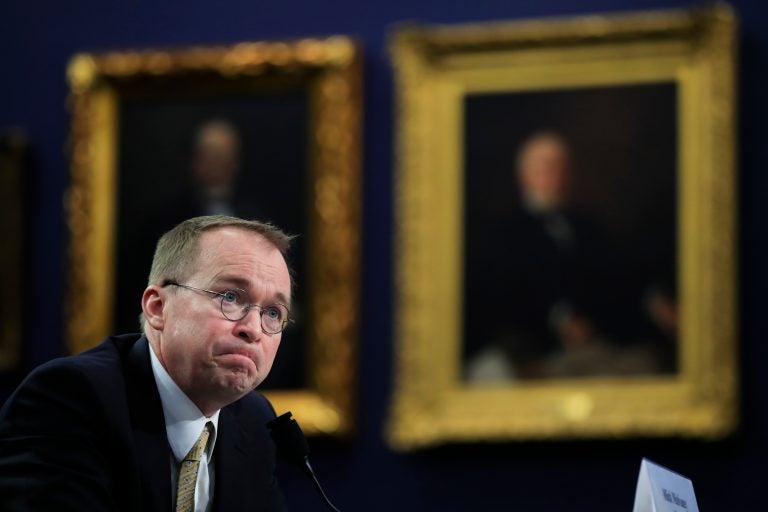Student loan watchdog quits; blames Trump administration

Office of Management and Budget Director Mick Mulvaney testifies before a House Appropriations Committee hearing on Capitol Hill in Washington. Mulvaney took over the CFPB as acting director in late November. (Manuel Balce Ceneta/AP)
The federal official in charge of protecting student borrowers from predatory lending practices has stepped down.
In a scathing resignation letter, Seth Frotman, who until now was the Student Loan Ombudsman at the Consumer Financial Protection Bureau says current leadership “has turned its back on young people and their financial futures.” The letter was addressed to Mick Mulvaney, the bureau’s acting director.
In the letter, obtained by NPR, Frotman accuses Mulvaney and the Trump administration of undermining the CFPB and its ability to protect student borrowers.
“Unfortunately, under your leadership, the Bureau has abandoned the very consumers it is tasked by Congress with protecting,” it read. “Instead, you have used the Bureau to serve the wishes of the most powerful financial companies in America.”
The letter raises serious questions about the federal government’s willingness to oversee the $1.5 trillion student loan industry and to protect student borrowers.
Frotman has served as Student Loan Ombudsman for the past three years. Congress created the position in 2010, in the wake of the financial crisis, as part of the Dodd-Frank Wall Street Reform and Consumer Protection Act. As Ombudsman and Assistant Director, Frotman oversaw the CFPB’s Office for Students and Young Consumers and reviewed thousands of complaints from student borrowers about the questionable practices of private lenders, loan servicers and debt collectors.
Since 2011, the CFPB has handled more than 60,000 student loan complaints and, through its investigations and enforcement actions, returned more than $750 million to aggrieved borrowers. Frotman’s office was central to those efforts. It also played a role in lawsuits against for-profit giants ITT Tech and Corinthian Colleges and the student loan company, Navient.
Over the past year, the Trump administration has increasingly sidelined the CFPB’s student loan office. Last August, the U.S. Department of Education announced it would stop sharing information with the bureau about the department’s oversight of federal student loans, calling the CFPB “overreaching and unaccountable” and arguing that the bureau’s actions were confusing borrowers and loan servicers alike. Of the move, Frotman writes, “the Bureau’s current leadership folded to political pressure… and failed borrowers who depend on independent oversight to halt bad practices.”
In May, Mulvaney called for a major shake-up in Frotman’s division. The Office for Students and Young Consumers would be folded into the bureau’s financial education office, signalling a symbolic shift in mission from investigation to information-sharing. While the CFPB told NPR at the time that the move was “a very modest organizational chart change,” consumer advocates reacted with alarm.
Mick Mulvaney was tapped to run the CFPB while also serving as director of the Office of Management and Budget. Before joining the Trump administration he was a Republican Congressman from South Carolina and a fierce critic of the bureau he now manages. He once called the CFPB “a joke … in a sick, sad kind of way” because, Mulvaney argued, it often acted above the law with no accountability to Congress.
Frotman has served at the CFPB for seven years, since its inception. He arrived in early 2011 as part of the Treasury Department’s implementation team. Frotman began in the Office of Servicemember Affairs as senior advisor to Holly Petraeus. That office was instrumental in expanding servicemember protections under the Military Lending Act and in cracking down on lenders and retailers that preyed on servicemembers.
The CFPB did not immediately respond to a request for comment. This story will be updated.
9(MDAzMzI1ODY3MDEyMzkzOTE3NjIxNDg3MQ001))




